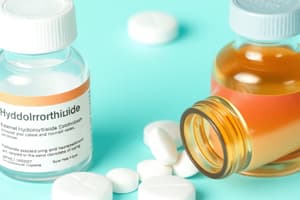Podcast
Questions and Answers
What is the therapeutic classification of Clonidine?
What is the therapeutic classification of Clonidine?
- Antihypertensives (correct)
- Analgesics
- Antidepressants
- Stimulants
Indications for Clonidine include which of the following? (Select all that apply)
Indications for Clonidine include which of the following? (Select all that apply)
- Mild to moderate hypertension (correct)
- Management of cancer pain (correct)
- Attention-deficit hyperactivity disorder (ADHD) (correct)
- Severe depression
What is the action of Clonidine?
What is the action of Clonidine?
Stimulates alpha-adrenergic receptors in the CNS, decreasing sympathetic outflow.
What is the therapeutic effect of Clonidine?
What is the therapeutic effect of Clonidine?
What is the dosage range for Clonidine in adults for hypertension?
What is the dosage range for Clonidine in adults for hypertension?
What are some common side effects of Clonidine? (Select all that apply)
What are some common side effects of Clonidine? (Select all that apply)
Which conditions require precautions when using Clonidine? (Select all that apply)
Which conditions require precautions when using Clonidine? (Select all that apply)
Clonidine is contraindicated in patients with hypersensitivity.
Clonidine is contraindicated in patients with hypersensitivity.
What should be monitored when a patient is on Clonidine?
What should be monitored when a patient is on Clonidine?
What lab test results may be affected by Clonidine?
What lab test results may be affected by Clonidine?
What drug interactions cause additive sedation with Clonidine?
What drug interactions cause additive sedation with Clonidine?
Which drugs can cause additive hypotension when taken with Clonidine?
Which drugs can cause additive hypotension when taken with Clonidine?
What is the effect of MAO inhibitors on Clonidine's efficacy?
What is the effect of MAO inhibitors on Clonidine's efficacy?
What patient teaching should be provided regarding Clonidine use?
What patient teaching should be provided regarding Clonidine use?
Flashcards are hidden until you start studying
Study Notes
Clonidine Overview
- Clonidine, marketed as Catapres, is classified as an antihypertensive medication and falls under the adrenergics (centrally acting) pharmacological class.
Indications
- Administered orally or transdermally for mild to moderate hypertension.
- Used for attention-deficit hyperactivity disorder (ADHD) as either monotherapy or adjunctive treatment (specifically Kapvay).
- Applied epidurally for managing cancer pain unresponsive to opioids.
- Unlabeled uses include managing opioid withdrawal and adjunctive treatment for neuropathic pain.
Mechanism of Action
- Acts by stimulating alpha-adrenergic receptors in the CNS, leading to decreased sympathetic outflow which inhibits cardioacceleration and vasoconstriction.
- Prevents pain signal transmission by stimulating alpha-adrenergic receptors in the spinal cord.
Therapeutic Effects
- Results in decreased blood pressure and pain relief.
- Improves symptoms of ADHD.
Dosage Information
- Oral dosage for adults and adolescents over 12 starts at 100 mcg twice daily, titrating to 200-600 mcg daily in divided doses, up to 2.4 mg/day.
- For urgent hypertension treatment, an initial loading dose of 200 mcg is given, followed by hourly doses until control is achieved.
- Transdermal patches deliver 100-300 mcg over 24 hours, applied weekly.
- Epidural doses begin at 30 mcg/hr, titrated as needed.
Adverse Effects
- Common side effects include drowsiness and dry mouth.
- Other notable CNS effects include depression, dizziness, and hallucinations.
- Cardiovascular effects may include AV block, bradycardia, and hypotension.
- Gastrointestinal issues can involve dry mouth and constipation.
- Risk of weight gain and paresthesia also noted.
Precautions
- Caution advised in patients with serious cardiac or cerebrovascular conditions and those with renal insufficiency.
Contraindications
- Hypersensitivity reactions contraindicate use.
- Epidural administration is contraindicated with injection site infections or bleeding disorders.
Patient Assessments
- Regular monitoring of intake/output, blood pressure, and pulse is essential during treatment.
- Evaluate pain severity and symptoms of opioid withdrawal if applicable.
- ADHD assessment should focus on attention span and impulse control.
Laboratory Tests
- May temporarily elevate blood glucose levels.
- Can cause decreased urinary catecholamines and vanillylmandelic acid (VMA) concentrations; abrupt withdrawal can reverse these changes.
- May yield weakly positive Coombs' test results.
Drug Interactions
- CNS depressants, such as alcohol and opioids, can cause additive sedation.
- Antihypertensives and nitrates may enhance hypotensive effects.
- Bradycardia risks are increased with beta blockers and calcium channel blockers.
- MAO inhibitors, amphetamines, and tricyclic antidepressants can reduce clonidine's antihypertensive effect.
- Withdrawal from beta blockers may exacerbate symptoms.
Patient Education
- Patients should ensure an adequate supply of medication during weekends and holidays.
- Encourage carrying a written prescription for emergencies.
- Warn about potential drowsiness, particularly during initial treatment phases.
Studying That Suits You
Use AI to generate personalized quizzes and flashcards to suit your learning preferences.



